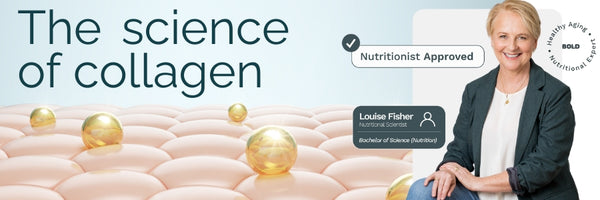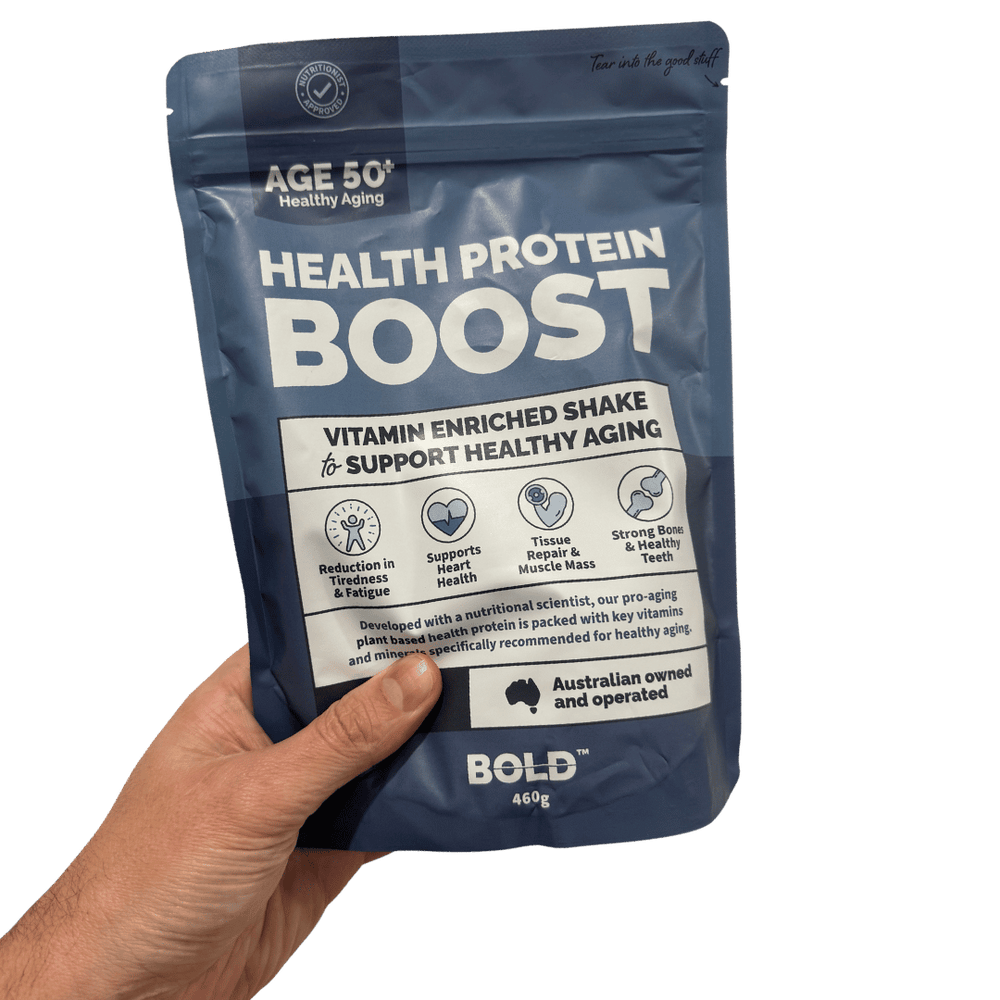The benefits of collagen, according to a Nutritional Scientist

How does collagen help nurture your skin and joint health?
Did you know that protein makes up about 20% of the human body and is found in every cell? ‘Sure, but what does this have to do with collagen?’ you might ask. Well, collagen is the most abundant protein in our bodies and, as such, plays a vital role in many functions.
A quick Google search for ‘collagen’ will return many results, claiming benefits from skin healing and radiance to joint health. But are these based on science? We sat down with Louise Fisher, our in-house Nutritional Scientist, to learn more about collagen—what it is, why it is important for people over 50, and how we can include more in our diets.
What is collagen and what does it do?
Louise: Collagen is the most abundant structural protein in the human body - it accounts for about 30% of all body proteins. Specifically, collagen is a key component of our connective tissues and plays three critical roles. It gives strength to our tendons and ligaments. It forms the structure of bones and cartilage. It helps give strength and resilience to our skin - in fact, it makes up 80% of our skin.
Collagen is made up of 19 amino acids, which are the building blocks of protein molecules. Three of these amino acids, glycine, proline and hydroxyproline, make up the foundation of the triple helix rope-like structure of collagen to make it strong, flexible and resilient. This triple helix structure maintains strength in connective tissues like tendons and ligaments and keeps our skin plump and elastic.
Why is collagen important for people over 50?
Louise: Current research shows that people need more protein from mid-life on, and collagen plays an important and unique part in this. Collagen supplements are the best source of hydroxyproline - one of the key amino acids of that triple helix structure. While collagen supplements can be helpful, it's still important for people to take them alongside a healthy diet that includes other protein sources as well.
As we age, especially from about around 50, our bodies produce less collagen. At the same time, our existing collagen gets broken down - partly because of the natural turnover of protein in the body as well as lifestyle factors such as unhealthy diets, chronic stress, sun exposure, smoking, and alcohol. We end up with collagen damage, which can affect how our skin looks and how our joints feel.
No one should say that taking collagen will make you look like a 20-year-old. I wish! However, there are many studies on collagen that indicate noticeable skin health benefits, especially skin elasticity, hydration, and tone. Other research suggests collagen can also help joint health - there’s a lot of sports science research looking at this now.
I want to add that there are some older people who it’s not ideal for - mainly people with chronic kidney disease who generally need to limit protein.
How can I get more collagen in my diet?
Louise: There are a variety of foods that are rich in collagen, but it’s not easy or ideal to eat a lot of them. Some of the richest sources are tougher cuts of meat with lots of connective tissue, processed meats and the bones and skin of fish. Some people have bone broth for the collagen but that really doesn’t appeal to everyone. Collagen supplements are a convenient way for most people to increase their collagen intake. Unlike some other protein supplements, collagen can be easily added to hot drinks, so it’s an easy way to increase protein, especially in the morning.
An important thing to look for in supplements is the collagen source and how it is processed. For example, when creating Bold Collagen Glow we decided to go with marine collagen as this is made up of Type I collagen, which makes up 90% of the collagen in our bodies and is the most studied in the research. The collagen in Bold Collagen Glow is broken down into peptides, which are smaller pieces of the protein that our bodies absorb in the gut. In other words, our collagen is highly bioavailable - it’s easier for the body to absorb (and use).
If you are looking to leverage the benefits of collagen it’s a great idea to include foods high in zinc and Vitamin C in your diet. Foods high in zinc are shellfish (especially oysters), nuts and seeds, legumes, and red meat like lamb and beef. Good sources of Vitamin C include citrus fruits, berries, leafy greens, capsicums, and tomatoes.
Our key takeaways
Understanding collagen's essential role in our bodies is essential to unlocking its potential benefits. From our conversation with Louise we learn that:
- Collagen is important to skin and joint health
- From around 50, our bodies produce less collagen and our existing collagen gets broken down.
- Many studies on collagen that indicate noticeable skin health benefits, especially skin elasticity, hydration, and tone
- Collagen supplements are a convenient way for most people to increase their collagen intake, however they should be used as part of a healthy diet.
- Collagen peptides are smaller pieces of the protein that are easier for the body to absorb (and use).
We’re proud to introduce Bold Collagen Glow, our carefully crafted marine collagen, designed to support your body's collagen levels, nurturing your skin from within.



